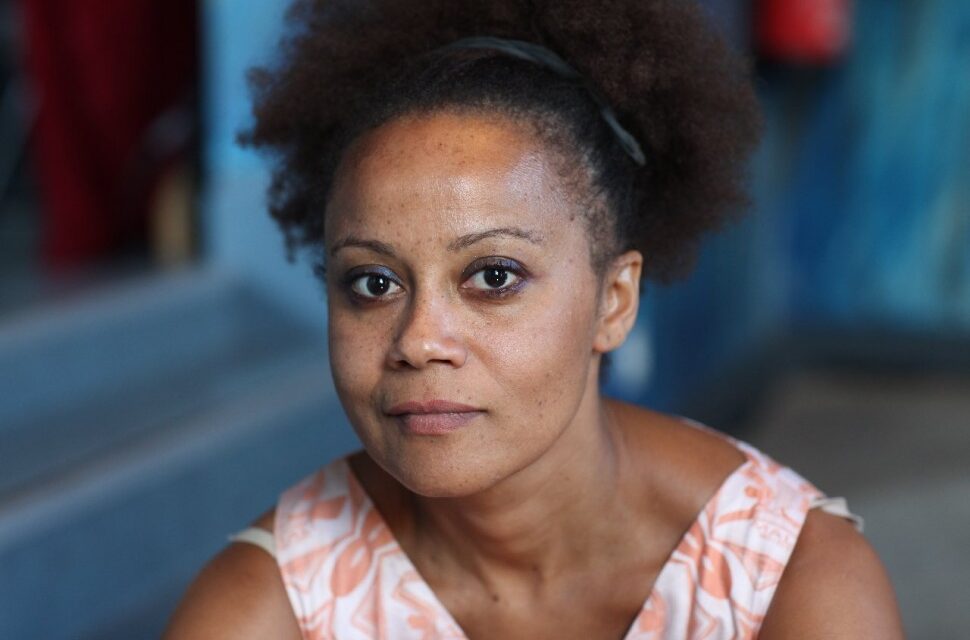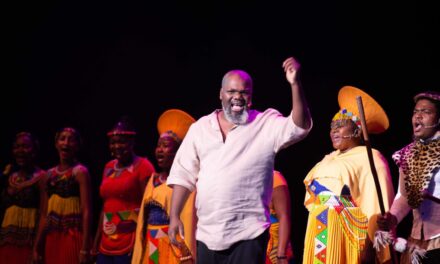Eva Doumbia is a writer, director and actress. Her creative residence in New Orleans for the development of “Authophagies” was postponed due to the COVID-19 crisis, as well as the premiere of the show planned at the Avignon Festival.
Read our interview with Doumbia in English (and further down in French) below.
French Cultural Services: What is the immediate impact of the Covid-19 crisis for your Theater company and your projects?
Eva Doumbia: Since September 2019, the company that I direct has resided at the Théâtre des Bains Douches in Elbeuf, close to Rouen in Normandy. The agreement is set for 3 years. It is a residential space for creation; we do not do traditional presentations. Our mission is to encourage an audience that is distant from theater to come and see rehearsals, to participate in creations.
We have two participatory projects: The first is called “Devoirs Surveillés” – It is a series that is inspired by audiovisual serials and is written in collaboration with two groups of students (high schoolers and middle schoolers). Each episode is played by two actors/actresses each month. The second is a request by the town’s CCAS (Communal Center of Social Action). It consists of the creation of an intergenerational cabaret, including a group of senior citizens (65+) and a class of high schoolers who specialize in music. The theme of this cabaret is linked to “Autophagies”: Food, memories. The first meetings between the 15/16-year-old teenagers and the 60/70-year-old participants were very touching. It is very sweet.
These two projects are paused for the moment. With one of the teachers who is collaborating with us for “Devoirs Surveillés”, we have been considering a written continuation of the project. But this is difficult because very few students have access to a computer (Elbeuf is a working-class town with a high rate of unemployment). The nature of the intergenerational project requires us to postpone it until at least October 2020.
The French version of “Autophagies” [a new work] was supposed to be created for the 74th Festival of Avignon. I was supposed to come to New Orleans in April this year to work on the latest script about the links between the sugar crop culture and slavery. I was also going to prepare the English version of the script with Amelia Parenteau; hold an audition for an American actress; offer a workshop on African gastronomy with Alexandre Bella Ola, the head chef with whom I collaborate…All of this is postponed. We must wait for the sanitary situation to improve.
French Cultural Services: How do you imagine the near future? And beyond?
Eva Doumbia: I am unable to concretely imagine the future. I think we must face the present, reflect on what we, and others, need. I was, like many, unable to produce or write in the early stages of confinement. Today, the essential is my energy. I use it to try and maintain a critical mind, to not give into the terror, to be patient. I have taken back up reading. I read literature and philosophy and reflect on how to let this experience come through in creation.
Let’s take “Autophagies”, for example: How can we share a meal during a show? Will we continue to consider others as potential carriers of the virus and, therefore, enemies from which we must stay far away.
I am not thinking about historical ruptures. There are some events that are catastrophic and the world adapts. Slavery and colonial conquests were catastrophes, the wars in Syria and Yemen are catastrophes; to be a woman in Saudi Arabia is a catastrophe, as well as being born during the dry period in Nigeria. Yet, we are not talking about ruptures.
French Cultural Services: How do you hope to share your art / your work and to remain in contact with an audience in the coming weeks? And beyond…
Eva Doumbia: I don’t know. In the coming weeks, maybe through written text. Filming shows works well. The CDN of Normandy Rouen and Axe Sud showed “La Vie sans Fards”, which I staged, and then the autobiography of Maryse Condé. I was skeptical because I was telling myself that nothing can compete with movies or TV series. And then I felt the lack of theater, and I started to watch the filmed clips of shows that I had not been able to see. But I think that in order to have this desire, you must already have the habit of seeing theater — at least for what concerns this type of theater, the theater of art. Because filmed theater has always existed, this had a lot of success when I was a kid — “Au théâtre ce soir” (“To the theater this evening”).
As of now, I do not know what the future holds. Maybe we will be traumatized and used to fearing others. Or maybe we will want to reunite ourselves in order to turn this common experience into shows and drama. Or may be both at the same time. Above all, today, I need to understand the present.
April 2020
Interview conducted by Nicole Birmann Bloom, Program Officer, Performing Arts, French Cultural Services. Translation by Jessica Cohen.
About Eva Doumbia
A writer, director, and actress, Eva Doumbia founded the theater company, La Part du Pauvre/Nana Triban in 1999, and since then has directed more than twenty shows that have premiered and toured in France and abroad. She works at the intersection of several domains, working regularly with artists from other disciplines and stepping outside theatres to present performances and small-format pieces in unusual settings. An avid reader and literary scout, she was on the jury for the Mahogany Prize, awarded to writers from Africa and its diaspora. She presented works by Aristide Tarnagada (Burkina Faso) and Léonora Miano (Cameroon), Maryse Condé, Fabienne Kanor among others, and was one of the first people to work with Dieudonné Niangouna and Marie-Louise Bibish Mumbu.
Her first novel, Anges Fêlées, was published by Vents d’Ailleurs in October 2016. Eva Doumbia is also a teacher, and runs regular training sessions and workshops in Africa and the Caribbean. She is artistic director of several multidisciplinary events dedicated to French cultures of African descent, such as Massilia Afropea in Marseille. She is also the co-founder of the “Décoloniser les Arts” collective, whose members are French-born artists and arts journalists belonging to minorities. In September 2019, Eva Doumbia became director of Théâtre des Bains-Douches in Elbeuf, a multicultural, working-class town in Normandy. Also in 2019, her creative residency in New Orleans for the development of her new work “Autophagies” in an English version events was selected the program FACE Contemporary Theater.
This article was originally posted at French Culture and has been reposted with permission. To read the original article, click here.
This post was written by the author in their personal capacity.The opinions expressed in this article are the author’s own and do not reflect the view of The Theatre Times, their staff or collaborators.
This post was written by Nicole Birmann Bloom.
The views expressed here belong to the author and do not necessarily reflect our views and opinions.


















